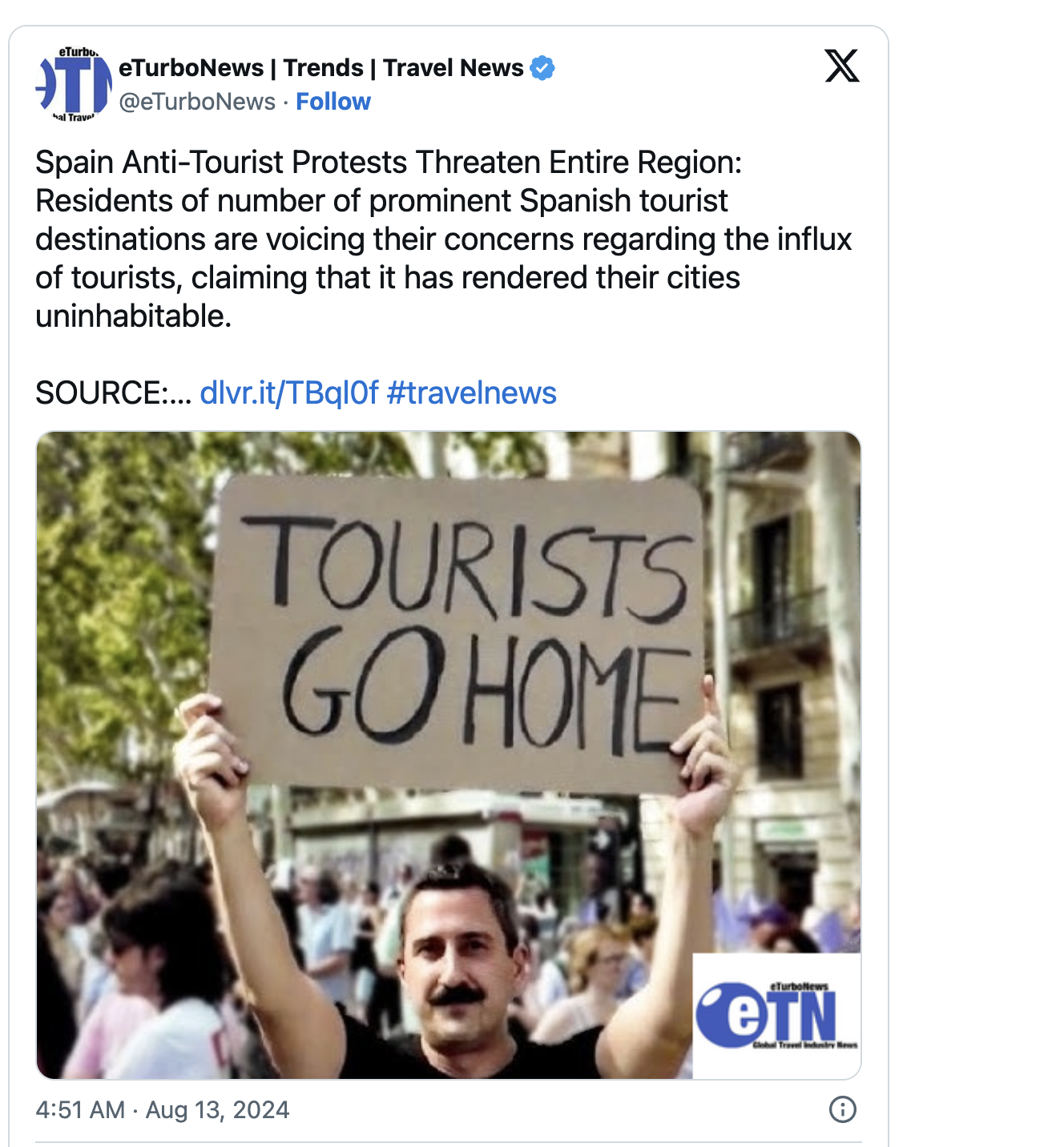With overtourism within the highlight because the journey trade continues to rebound after the pandemic, standard locations around the globe are feeling the pressure.
Bali is overwhelmed by waste and visitors, Australia’s sacred websites have suffered environmental harm, New York is going through rising rents resulting from short-term leases and Singapore’s scenic spots have gotten clogged with crowds.
Frustrated locals are pushing again – from spraying water at vacationers in Barcelona to organizing protests in Venice. As the northern hemisphere excessive season ends, Aotearoa New Zealand is making ready for an inflow of holiday makers forward of its summer time tourism season.
And very like these different vacationer hotspots, the federal government is taking a look at handle the unfavourable results of tourism on native communities and the surroundings. This consists of tripling the worldwide vacationer tax from NZ$35 to $100.
The goal of the rise is to appeal to vacationers who’re extra aware of their affect and prepared to contribute to its mitigation, whereas additionally decreasing customer numbers to guard the nation’s distinctive landscapes and cultures.
But are there different methods the tourism trade can evolve to make sure advantages for each vacationers and the communities they’re visiting? So referred to as “slow travel” may very well be the reply.
Hunting the proper photograph
Overtourism isn’t nearly too many individuals in a single place. It’s additionally about how folks journey.
Instagram-famous landmarks draw large crowds, disrupting native life and typically even resulting in closures.
Travelers typically pack their itineraries with as many sights as potential, racing from one place to a different in a frenzy to seize the proper photograph. This hurried strategy not solely creates congestion but in addition limits significant engagement with the vacation spot.
And it’s not only a numbers recreation. The approach vacationers behave additionally performs a vital function.
A 2019 report from the United Nations raised issues about trash from vacationers in creating small island states, together with the Pacific Islands. According to the report, a vacationer visiting these communities produced about 7 kg of waste a day, in comparison with about 2.5 kg produced by an area.
The subject just isn’t essentially about touring much less, however about touring extra responsibly. The tourism trade must be encouraging journey habits that enable each guests and locals to take pleasure in tourism with out compromising the integrity of the vacation spot.
The rise of sluggish journey
Mindfulness – being absolutely current within the second – has gained reputation because the Nineteen Seventies. The idea has influenced quite a few sectors, together with sluggish meals, sluggish trend and now sluggish journey.
It’s about experiencing locations at a relaxed tempo, specializing in deeper connections with native cultures and sustainability. This typically means staying longer in fewer locations and selecting eco-friendly transport.
Understanding sluggish journey and mindfulness is essential as a result of they create richer, extra memorable experiences. Fast, hectic journey typically leaves little constructive affect. Slow immersive journey, then again, fosters lasting recollections and reduces overtourism, air pollution and cultural harm.
Research reveals after we consciously immerse ourselves in our environment we will have extra significant experiences. Surprisingly, even luxurious journey – typically dismissed as wasteful – can encourage respect and mindfulness for many who make investments financially and mentally of their journey, in contrast to cheaper, mainstream tourism.
Activities comparable to “forest bathing”, mountain climbing or partaking with native cultures increase wellbeing and which means, going past simply “taking a photo for likes”.
This aware strategy can change our behaviour on a private degree. By focusing consideration on fewer experiences, travellers can heighten their sense of awe and appreciation, making the journey extra memorable.
This concept is clear in “peak experiences”. Disney, for instance, creates emotionally-charged moments that stick in guests’ minds. Other experiences, comparable to “digital detoxes” or pilgrimages can go away a contemplative impression.
By concentrating on a single side of a go to, it turns into particular and memorable. Even in busy locations like Disneyland, specializing in one distinctive aspect could make the expertise really feel slower and extra significant.
The sustainability of tourism
In the Faroe Islands, sluggish journey helps defend native traditions and landscapes by encouraging considerate customer conduct, comparable to utilizing native guides to reduce environmental affect.
New Zealand can leverage its pure magnificence to supply related immersive experiences. Tramping (mountain climbing), for instance, can promote a aware reference to the surroundings.
But even right here, there must be a give attention to balancing tourism with preservation. Popular spots, such because the Department of Conservation huts and the Te Araroa Trail, are already changing into crowded. It is crucial to teach guests on accountable practices – comparable to cleansing tools – to make sure they perceive their function in defending nature.
Travel that fosters a deeper appreciation for native cultures and environments advantages each guests and the locations they discover. The problem is discovering the suitable steadiness – encouraging significant journey experiences whereas nonetheless making certain accessibility for all.
Amy Errmann is Senior Lecturer, Marketing & International Business, Auckland University of Technology.
The Conversation is an impartial and nonprofit supply of news, evaluation and commentary from educational consultants.
- External Link
-
https://theconversation.com/crowds-water-guns-and-protests-could-slow-tourism-be-the-answer-to-an-overtourism-backlash-238316
© The Conversation


